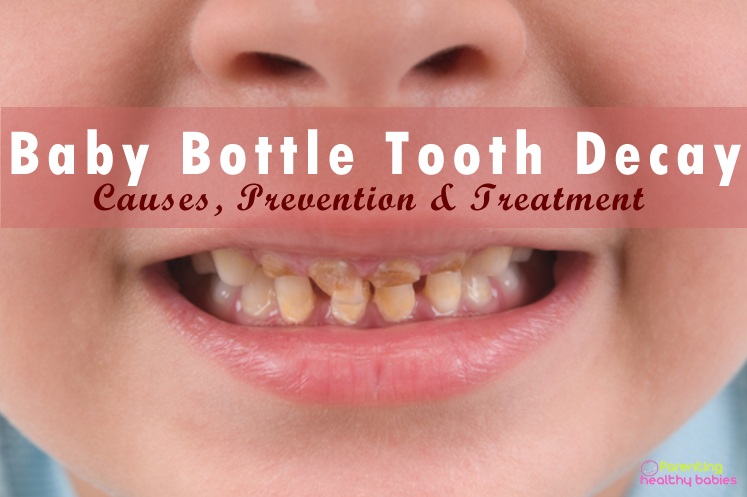The center of your world is your little baby and as parents every smile, gesture or action means the world to you. The primary need of an infant is feeding. A mother may choose to breastfeed her baby or in many cases, supplement it with bottle feeding. Baby bottle feeding provides good nutrition for a baby. But did you know that the baby bottle feeding is associated with tooth decay? This is mainly because of baby milk bottle feeding practices which encourage the formation of dental plaque in the baby’s mouth.
What is baby bottle tooth decay?
Baby bottle tooth decay is also called early childhood caries. It is essentially tooth decay or dental caries of baby teeth due to improper bottle feeding habits. Since it is caused by baby bottle feeding, it is also called nursing bottle mouth, baby bottle syndrome, milk bottle caries or rampant caries. Baby bottle tooth decay arises early in life.
This could be as early 1 year of age. Baby bottle tooth decay begins as a white chalky area around the gum line of a baby tooth. Gradually, it spreads to cover the entire tooth surface. Later it may discolor, giving the tooth a yellow to brown appearance. Finally, the tooth may chip off or completely break off, as it weakens due to the dental decay process. The first teeth to be affected are generally the upper front baby teeth or primary maxillary anterior incisors. Gradually, the decay process engulfs other teeth too, resulting in a mouth full of decayed baby teeth.
Causes, Prevention and Treatment for Baby Bottle Tooth Decay
Causes of baby bottle tooth decay
Dental decay causing bacteria begin to inhabit the mouth as soon as the first tooth appears, at about 6-7 months. These bacteria stick to the baby teeth as they erupt and inhabit a layer of dental plaque. If these microorganisms are provided with an oral environment that encourages them to grow, these microorganisms begin to grow and cause dental caries. Most baby bottle formula or infant milk formula is rich in sugars.
Plain water in baby bottle does not cause tooth decay, but milk and other sweet liquids can do so. Oral bacteria that reside in the baby’s mouth use the sugars from bottle milk and act on them to produce acids. These acids cause breakdown of baby tooth structure. In other words, these bacteria cause baby bottle tooth decay or dental caries of baby teeth. Baby bottle milk feeding can cause dental caries or decay due to flowing improper bottle feeding practices such as –
- Frequent milk bottle feeding at night
- Bottle feeding with juice at night
- Not brushing a baby’s teeth at least twice a day
- Prolonged milk bottle feeding beyond 12 to 18 months of baby’s age.
Prevention of Baby bottle tooth decay
Baby bottle tooth decay can easily be prevented by a few easy ways. First, a baby may be given milk in a bottle, but avoid frequent night time bottle feeding habits. Begin brushing your baby’s teeth as soon as the first tooth erupts into the mouth. Regular tooth brushing, at least twice a day can help greatly in taking care of your baby’s teeth. A toothpaste containing fluoride may be used in very small amount (rice sized or a smear) up to the age of 3 years.
Ensure that all remnants of toothpaste are removed from the baby’s mouth and not swallowed. A soft toothbrush may be used to clean baby teeth. Baby gums may be cleaned using a clean cloth or with baby tooth wipes. Do not forget to clean a baby’s tongue as well, as it also harbors decay causing bacteria. Begin weaning your child off the baby bottle by at least 1 year of age. Begin the transition from a baby milk bottle to a cup by then.
Finally, visit your pediatric (children’s) dentist as soon as baby teeth begin appearing in the mouth. A children’s dentist can spot the first signs of baby bottle tooth decay and guide you about prevention and treatment measures.
Treatment of Baby bottle tooth decay
Untreated baby bottle tooth decay can have severe consequences for your child. Baby bottle tooth decay spreads rapidly, leading to pain and discomfort for your child. The baby teeth discolor and give an unsightly appearance to your child’s smile, decreasing a child’s self esteem. Deep dental decay can lead to dental abscesses and infection, requiring long treatment time. If baby bottle tooth decay occurs in your baby, visit a children’s (pediatric) dentist immediately for dental advice and treatment.
If the tooth decay is advanced, tooth extractions or removal may be required, which can be traumatic for your child. A pediatric dentist will examine your child’s teeth and perform dental fillings or restorations as required. Dental fillings involve removal of decayed tooth structure and filling it in with a suitable tooth friendly dental material. In case of deep dental decay or caries, pulp therapy or root canal therapy may also be required or tooth extractions.
Baby teeth of a child are as precious as adult teeth. They perform important functions of retaining space for future adult teeth, allow proper chewing and speaking, contribute to pleasant appearance and self confidence of your child. Prevention is the best cure when it comes to baby bottle tooth decay. Follow good oral hygiene measures and avoid a lifetime of dental visits for your child.
Your child’s smile is worth more than millions!
References
https://www.ncbi.nlm.nih.gov/pmc/articles/PMC4501180/
http://www.aapd.org/media/Policies_Guidelines/P_ECCClassifications.pdf
